How I Came to Compassion
I believe all children growing up, regardless of which corner of the world they were born into, will always have a dream of what they want to be when they grow up. Some live their dream well; others are not lucky enough to live their dreams.
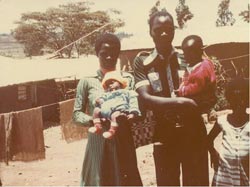 As a child, I held onto my dream despite the glaring poverty that threatened to kill it. I dreamed I would be some sort of a great leader when I grew up. My parents always reminded me that it would be important to work hard in school and trust in God in order for my dreams to come true.
As a child, I held onto my dream despite the glaring poverty that threatened to kill it. I dreamed I would be some sort of a great leader when I grew up. My parents always reminded me that it would be important to work hard in school and trust in God in order for my dreams to come true.
Childhood memories are still fresh in my mind. I grew up in a neighborhood of 10′ x 10′ shelters made out of sticks, mud walls and iron sheet roofs.
My father volunteered as a church planter in the slums while my mother made and sold African attire known as ‘Kitenge’ in a small market nearby.
I watched one of my sisters die at age 3. I was only about 4 years old then.
Many children die before the age of 5 in my community. Perhaps that explains why most parents have many children — they have to take chances because they aren’t sure which ones will make it.
I am one of five siblings that survived. My eldest sister is 32 years old and I am the second oldest. I have a younger sister who is 25 and a brother who is 24. My youngest sister is 19.
Infrastructure is a great challenge in my community. There are no nearby hospitals or schools, so we remained isolated from the rest of the world.
Without medical coverage, a hospital visit in the neighboring town reaps hefty hospital bills. It is particularly hard for parents who cannot find employment.
As a result, many parents avoid taking their children to hospital for fear of being detained in hospital if they can’t afford the fees.
Only in serious cases is anyone taken to hospital and, even then, transportation is a challenge. Some of them never make it in time and die on their way.
Bitter herbs are common for most illnesses, and as a kid I dreaded saying I was sick because it was hard to stomach the bitter herbs going down my throat.
Sanitation was and still remains a great challenge in Kibera.
Residents answer the call of nature in buckets in the comfort of their small houses and pack the waste in plastic bags, which they throw out of their windows at night. This practice led to the rise of a new term — “the flying toilets of Kibera.” Curfew hours begin at 8 p.m. in Kibera, and puu-puu begins flying through the windows.
My father believed that the reason he was living in abject poverty is because he never had the privilege of completing his high school education. He resolved to give his children good educations if he could.
My family eventually moved from Kibera to Dandora, about half an hour east of the city of Nairobi.
Dandora is known for being the largest dumping site in Kenya, where crime and all sorts of evil reigns. Dad relocated the family to Dandora because the government was setting up public schools there and he wanted us to be in a neighborhood with public schools.
When we moved to Dandora, I started schooling immediately. My dad, together with five other families, founded Dandora Baptist Church. (more…)
Continue Reading ›Can Anything Good Come Out of a Slum?
My biggest fear in life is not reaching my God-given potential. And for the first 20 years of my life, I found myself being increasingly shaped by worldly values. That is, until I came face to face with Jesus!
Since then my Creator and Saviour has been helping me to weed out values that are contrary to those of the Kingdom and walking with me towards the dreams He’s planted in my heart. It’s been a step-by-step process of learning to be faithful with what He entrusts me with.
Of course, going against the patterns of this world isn’t easy, but the fruit of obedience is liberating! I wouldn’t want to live any other way. Life’s exhilarating when you’re dancing with a God of the supernatural.
Thanks to modern technology, I met a Compassion alumnus Paul Omondi through Facebook! Paul shared his testimony with me … It’s more than encouraged me to be all that I can be; it’s given me hope.
Paul completed the Leadership Development Program in Kenya years ago (a program that educates, trains and disciples servant leaders), was recently married (congratulations Paul!), and now works to help his fellow Kenyans escape the cycle of poverty in his role as a Community Development Manager.
But every achievement starts with a heart that dares to dream.
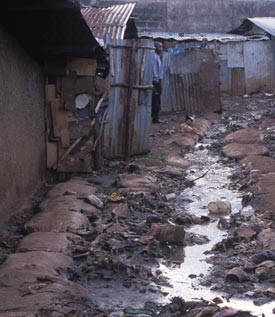
Twenty nine years ago in Kibera, 15 minutes outside of Nairobi, Kenya, a baby boy was born. Kibera is the biggest slum in Kenya. I can’t imagine what would’ve become of me if I was born there.
I’m reminded of the words of Nathanael when Philip told him that he had found ‘the one’ that Moses and the prophets wrote about. He said,
“Nazareth! Can anything good come from there?” — John 1:46a (NIV)
Can anything good come out of a slum?
Tune in all next week as Paul tells his story.
– Irene
Continue Reading ›A Different Perspective
Recently, my husband and I had the opportunity to have one of the Leadership Development Program Moody scholars stay with us. 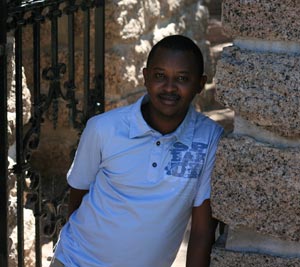 You’ve met Richmond, Michelle and Tony. Well, “Jimmy from Kenya,” as he likes to call himself, is our newest scholarship recipient.
You’ve met Richmond, Michelle and Tony. Well, “Jimmy from Kenya,” as he likes to call himself, is our newest scholarship recipient.
With Jimmy from Kenya (a.k.a. Jimmy Wambua) as a house guest, we were treated to the first reactions to life in America from the perspective of someone who had grown up in poverty.
After the first couple of days, I asked him how it was going and what struck him most about life in America. It was the cheese.
“In America, you are so particular about what you want. You take me to Subway and they ask, ‘What kind of bread do you want?’ ‘What type of dressing do you want?’ ‘What type of cheese do you want?’ In my country cheese is cheese. It’s this or it’s nothing.”
The variety in general was a bit overwhelming to Jimmy.
“When I asked Mike for tea, he opened the cabinet and there was so much. Tropical tea, dessert tea, tea cocktail. Even in cars you have variety. You have a car for different kinds of weather and different activities.”
At every turn, we seemed to be asking him to make choices. And let’s not even talk about our trip to Walmart.
He was also quite struck by our home and our neighborhood. We live in a fairly typical middle-class American neighborhood and home.
Before he came, I had felt a bit self-conscious because the other hosts of the students were older with nicer homes. I secretly thought he’d be disappointed to stay with us. I know this is a silly worry considering he was coming from a one-room home without indoor plumbing, but I was thinking about the Joneses.
His perspective was different than mine.
“This is the home of a politician. These are the couches of a politician … . This is what I’ll call stinking rich. You live in posh environments, but you don’t feel they are posh.”
Jimmy stayed in our basement, which has an attached bathroom. He said,
“When you first showed me my room, I thought, ‘This must be the main part of the house, the best part of the house.’ Then I saw it was just the basement. In my country, I could work for years and still not have something as nice as your basement.”
I asked Jimmy if it frustrated him or made him angry to see people with so much. I always wonder that when visitors come — are they secretly judging us? Jimmy was gracious.
“Someone without my background who is struggling might be angry. But my feeling is biased because of Compassion. I understand why God blesses Americans — what you give. I believe that spirit of giving has gotten into American culture. You’ve been able to be content with what you have and give to others instead of keeping it for yourselves. Because of your generosity, God has blessed. God rewards you for listening to his call.”
I hope I can live up to Jimmy’s generous attitude toward us.
My Best Day in Ministry: Blessed are the Poor
Hope Lives author, Amber Van Schooneveld, talks about her best day of ministry with Compassion International.
Alexander Needs Heart Surgery
Have you ever heard of Atrial Septal Defect (ASD)? Apparently, it’s a congenital heart defect.
 If you have a defect in your interatrial septum, the tissue that divides the right side of your heart from the left side, your blood can get confused. And if that happens, you end up with blood that goes where it shouldn’t. That’s bad.
If you have a defect in your interatrial septum, the tissue that divides the right side of your heart from the left side, your blood can get confused. And if that happens, you end up with blood that goes where it shouldn’t. That’s bad.
In a normal heart, the left ventricle has to produce enough pressure to pump blood throughout the entire body, but the right ventricle has to produce only enough pressure to pump blood to the lungs.
In the case of a large defect, this pressure difference means that blood from the left atrium can flood and enlarge the right side of the heart and, if left untreated, can result in heart failure.
That’s ASD in a nutshell. And this is why I tell you.
 Alexander is an 8-year-old Kenyan boy who has ASD. He is in the third grade and is the youngest child in a family of five. Because his heart has been pumping deoxygenated blood to his growing body for his entire life, Alexander is smaller than most children his age.
Alexander is an 8-year-old Kenyan boy who has ASD. He is in the third grade and is the youngest child in a family of five. Because his heart has been pumping deoxygenated blood to his growing body for his entire life, Alexander is smaller than most children his age.
In August 2008, during an evaluation at the child development center, a pediatrician noticed that Alexander has a heart murmur. Follow-up tests in Nairobi identified the birth defect and recommended a cardiac catheterization procedure and open heart surgery.
But Alexander’s parents are peasant farmers, and his mother sells fruit at the market to earn extra income. They survive on $13.70 per month.
$13.70 a month is barely adequate to meet the family’s basic needs, let alone pay for open heart surgery.
At this point, heart failure is a real possibility for Alexander. However, studies have shown that patients with a surgically repaired ASD have an excellent prognosis, particularly when the operation is done before the age of 25.
But Alexander’s family can’t afford the operation. It costs $8,303.
Alexander has been waiting to receive the surgery for several months now, since early December, but he can’t wait any longer. His condition has recently worsened – which made me think of something Amanda suggested back in February.
“I am just kicking around a few ideas here. What if Compassion had a “Spotlight of the Week” – or “Spotlight of the Month?” It could be either a child (medical need?), family, or small community need. It could even be in the area of the global financial crisis, disaster relief, Child Survival Program, or some other facet of Compassion. For example, one week you could highlight the (global food crisis) need of a community in Uganda to have goats or seeds for crops (or both). After the donations have been given, you could easily follow up with a story in the blog to share the results of the giving.”
So, Alexander has a need. And our objective is to give him a normal heart. Can we do this for him?
Make a donation to help pay for Alexander’s surgery. (Update: May 21, 2009 – You did it! And more. You contributed around $10,000. I expect to have the exact amount tomorrow.)
Thank you for loving this child.
As I receive updates on how Alexander is doing, I will share them with you. I can’t promise you updates with any degree of regularity though. I can just promise that there will be a follow-up.
Reviving God’s Army
I have read various articles, columns and statistics on the state of Christendom in America, and the prognosis isn’t good. Christian commentators across the country are doing their best to encourage our churches to get back to the basics, but their pleas seem to fall on deaf ears.
But underneath the apparent complacency plaguing our churches is a revival that God is stirring in the hearts of our young people.
Like the young boy David who faced the giant Goliath when grown men cowered in fear, it’s times like this that God calls on our young people to bring a revival to His army – to the Church of God.
In my last post, I mentioned how 14-year-old Emily Blake raised tens of thousands of dollars to reach out to as many as 100 children in Kenya suffering from malnutrition and poor hygiene. Now once again, it is another teen who is reaching out to make a difference for children and their families halfway around the world.
 Seventeen-year-old Jordan Foxworthy, daughter of comedian Jeff Foxworthy, recently had the opportunity to see the devastating effects of malaria while visiting Kenya with her family.
Seventeen-year-old Jordan Foxworthy, daughter of comedian Jeff Foxworthy, recently had the opportunity to see the devastating effects of malaria while visiting Kenya with her family.
Being moved to action, she helped start the Bite Back Against Mosquitoes campaign.
Through this campaign, she enlisted many other teens to join the fight against malaria and is encouraging the rest of us to join the fight as well.
Watch a video segment of Jordan talking about the Bite Back campaign on Christian World News.
God’s Army of One
It never ceases to amaze me how diverse the army of God is. I think in our adult minds, we all too often differentiate between “adult tasks” and “children’s tasks,” but God doesn’t think that way. His foot soldiers include people of all ages from every nation.
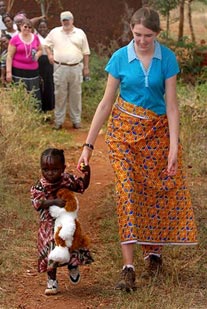 Consider for a moment the job of fundraising. Now, I’m not talking about the summer phenomenon of lemonade stands that offer a refreshing cup of the tart but sweet drink for 50 cents. I’m talking about the task of raising tens of thousands of dollars. Most of us would not consider that a child’s job.
Consider for a moment the job of fundraising. Now, I’m not talking about the summer phenomenon of lemonade stands that offer a refreshing cup of the tart but sweet drink for 50 cents. I’m talking about the task of raising tens of thousands of dollars. Most of us would not consider that a child’s job.
However, one 14-year-old wasn’t hindered by the adult mentality of the impossible. God instilled in young Emily Blake a passion for the possible.
While attending a church summer camp in 2007, Emily, then 12, heard the disturbing statistic that more than 25,000 children living in poverty die each day from such preventable causes as poor hygiene and lack of food. The young preteen looked around at the world she had grown up in and knew it didn’t have to be this way, so she decided to do something about it.
Uninhibited by her age, she successfully reached out to as many as 100 kids in Kenya whom she never met, and changed their lives forever.
This is how she did it.
Letters From Kenya
It amazes me how often God uses the “least of these” among us to teach us valuable life lessons. Having worked here for a little more than four months, I have already experienced this phenomenon many times, as the children we serve “speak” to me about things such as hope, faith, love and trust.
Last week, they spoke to me again from a place where you wouldn’t expect to find much of anything at all except despair, doubt, hatred and cynicism. (more…)
New Year’s Resolutions
I’m not much into New Year’s resolutions. I find it an odd tradition. If you really want to change your life, why wait until January 1 to start? But perhaps it’s a positive thing if it helps us to truly focus on being better human beings — even if our New Year’s resolutions only last a few days or weeks!
Take a look at some of these popular New Year’s resolutions for 2009:
- In 2009, I resolve to eat better.
- In 2009, I resolve to keep my home in better shape.
- In 2009, I resolve to take better care of my body.
- In 2009, I resolve to be better about what I spend my money on.
- In 2009, I resolve to look for a new job.
Any of those look familiar?
Now, go back and read those resolutions again … but this time, from the perspective of a person living in poverty.
Imagine a little boy in Kenya who resolves to eat better because he’s tired of going to bed hungry. Imagine a single mother in Peru who resolves to keep her 6’x6’ shack clean. I’ve seen families that sweep their dirt floors just to try to keep their humble homes presentable.
Imagine a little girl in India who wants to take control of her own body instead of falling prey to the men who abuse it. Imagine the family that scrapes together spare change to eat today. Imagine the father who is desperately searching for a job so he can give his children an education and a shot at life.
This year, I urge you to resolve to do something about global poverty. Get involved.
Here’s a list of suggested, revised New Year’s resolutions for you:
- In 2009, I resolve to go on a mission trip.
- In 2009, I resolve to help my church start a food pantry — or donate to an existing one on a regular basis.
- In 2009, I resolve to pray for children trapped in poverty.
- In 2009, I resolve to support a ministry that cares for the poor.
- In 2009, I resolve to think beyond myself and truly make a difference in the life of a child living in poverty.
And let’s try to make these New Year’s resolutions last.
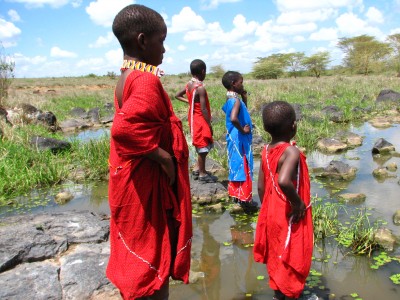
The Stigma of HIV and AIDS
One of the huge challenges facing people living with HIV around the world is not only the physical illness, but the overwhelming stigmatization and discrimination that exists in many countries.
Benson’s New Classroom
Benson wakes up at 6:00 a.m. every Saturday excited that he will see his friends and learn Bible lessons. On this particular Saturday, the children at his child development center learn a life-lesson, and child development director, Mercy, takes them through the devotion.
It’s chilly and the teacher starts the lesson. As drum beats fill the air, children fill with excitement — the right mood for a story.
Teacher Mercy starts,
“Once upon a time there were two buckets that hung by the Simenya Well. They kept on being drawn by the residents of Simenya. One late afternoon, tired with the day’s work, they took time to rest and spoke to each other.”
At this point Teacher Mercy coughs and holds two buckets as visual aid while pointing them to the children.
In the background, one hears a symphony of coughs and sneezes from the children because of the weather. Her “classroom” is outside.
She continues,
“One of the buckets was always grumbling. It never looked at life cheerfully. On this particular day, as it rested outside the well it said to the other bucket, ‘I am tired of the life we lead. However full we are when we are drawn up out of the well, we are sent back empty again. This makes me disappointed and dissatisfied.’
The second bucket looked at life differently. It did not grumble because it looked at the positive side of life. It said, ‘That’s true, but I always look at it this way — that however empty we are when we are set down, we are always full when draw up.'”
Teacher Mercy declares the end of the story, looks at the children, sees the cloudy skies, and whispers a prayer to God, “Please Lord, help us build classrooms to house these children.”
For the last three years, trees randomly placed in the Simenya Child Development Center church compound have been serving as “classrooms” for the children. Unfortunately the days can be nightmares for some of the children in the center, especially when they come to the wall-less classrooms, during extreme weather conditions.
According to Mercy,
“The long rainy seasons fall in March to May, while the short rainy seasons are during the months of August to September and sometimes trickle into October.
These are dreaded months by children, teachers and parents alike. One is likely to meet children shivering in the chilly days with hands tightly clasped across their chest, to preserve the little body temperature.
It is during this period, we have seen children affected by periodic fever. These are the times when we see children walk out of class or even stay away from the classes, with parents citing fear of fever attack.”
During the hot season months, we have not been spared either. This area has characteristic dry spells, which leaves the indigenous trees without leaves. Scorching sunbeams through the sketchy branches penetrate the out-door classes. Because of this, Simenya Child Development Center has made numerous efforts to address this immense challenge.
Pennies for the Poor
Story and Photo by Barb Liggett, Global Strategy Office Intern
Eugine is an 8-year-old from Kenya who wants to be a teacher when he grows up. Compassion believes that he — and all kids with big dreams — can do it. So does Katie Peters. This 15-year-old, from Colorado Springs’ The Classical Academy, has been raising money for Compassion since 2002 to help kids like Eugine reach their goals. Katie places jars with the slogan “Pennies for the Poor” in classrooms and hallways around her campus, about a mile from Compassion’s Global Ministry Center.

Katie posted signs around the school encouraging students and teachers to drop loose change into these jars. This simple act has gone a long way.
To date, Katie has raised more than $880 to help children across the world. Although Katie humbly claims she “was not a huge part, and it wasn’t all [her] money,” she organized this effort to raise money out of a caring and pure heart. She took the initiative to get permission from her principal to set the jars out, and at the end of each day she collects the jars and locks them in cabinets for safekeeping.
Despite all this work, Katie hopes her efforts go unnoticed by peers. She says that “I don’t try and tell people that I am doing it … I almost hope they don’t know it is me doing it. I hope they just know somebody cares.”
This is the servant’s heart Compassion seeks, the type of heart that is so powerful when embodied in a young person.
Katie chose Compassion from a long list of organizations, but for her the choice was simple. Her family began sponsoring a boy when she was 5, so she was already familiar with Compassion’s ministry.
About her family’s Compassion child, she explains that “he had graduated about the time I started Pennies for the Poor, so I decided there were still others like him who needed [help] through Compassion.”
Her family’s sponsorship was not the only experience that influenced her. When asked what provoked her to start collecting change, Katie says that “I started thinking I wanted to do something after my class had a character lesson about giving.” This, along with understanding the results of child sponsorship firsthand, inspired Katie to become an advocate for impoverished children around the world.


